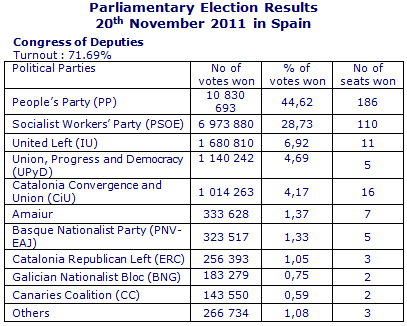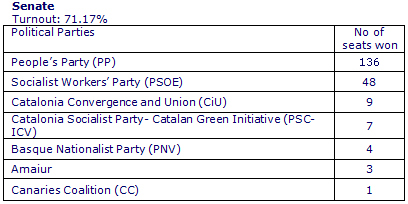News
Corinne Deloy,
Fondation Robert Schuman,
Helen Levy
-

Available versions :
EN

Corinne Deloy
Fondation Robert Schuman
Helen Levy
The People's Party (PP), the main opposition party led by Mariano Rajoy, easily won the general elections on 20th November in Spain, taking 44.62% of the vote and 186 seats (+32 in comparison with the election in 2008). The People's Party won the biggest absolute majority in its history and is therefore in a position to govern alone without being obliged to form an alliance with the nationalist or regional parties, as was the case until now.
Outgoing Prime Minister, José Luis Rodriguez Zapatero's Socialist Workers' Party led by Alfredo Perez Rubalcaba suffered a significant defeat winning 28.73% of the vote only and taking 110 seats, i.e. 59 MPs less. Cayo Lara Moya's United Left (IU) came third with 6.92% and 11 MPs (+9); followed by Union, Progress and Democracy (UPyD) 4.69% and 5 seats (+4); Catalonia Convergence and Union (CiU), led by Artur Mas, 4.17% and 16 MPs (+6); the Basque secessionist coalition Amaiur 1.37% and 7 MPs; the Basque Nationalist Party (PNV-EAJ) led by Inigo Urkullu 1.33% and 5 seats (-1), the Republican Left of Catalonia (ERC), led by Oriol Junqueras i Vies, 1.05% and 2 MPs (=), the Galician Nationalist Bloc (BNG) led by Guillerme Vázquez 0.75% and 2 seats (=) and the Canaries Coalition (CC), a party led by Claudina Morales, 0.59% and 2 MPs (=).
The People's Party won in 43 of Spain's 50 provinces, the Socialist Workers' Party won a majority in two provinces (Barcelona and Sevilla), Catalonia Convergence and Union won in three (Lleida, Gerona and Tarragon), Amaiur won one (Guipuscoa) and the Basque Nationalist Party in one also (Biscay).
The People's Party also won 136 seats in the Senate (+48) whilst the Socialist Workers' Party lost more than half of its senators (48 i.e. -53). Catalonia Convergence and Union (CiU) won 9 seats (+5); the Catalonia Socialist Party, which was allied to the Catalan Green Initiative (PSC-ICV), won 7 ; the Basque Nationalist Party, 4 (+2) ; Amaiur, 3 and the Canaries Coalition 1 (=).
Turnout in these elections totalled 71.69% (- 2.16 points regarding the last election on 8th March 2008). Turnout in the senatorial election totalled 71.17% (- 3.32 points).
The People's Party (PP) therefore easily won the election, which had been forecast in all of the polls. Or should we rather say that the PSOE lost the election? The failure of the socialists, who had been in office for the last eight years, to put a halt to the serious economic crisis and the great social suffering in Spain, led to the change in government. The PP's success certainly owes more to the rejection of José Luis Rodriguez Zapatero's government than to the Spanish acceptance of the PP's programme or to Mariano Rajoy's personality. "The crisis has given absolute power to Rajoy" read the headlines in the newspaper El Pais on 21st November.
"Today more than ever, our fate is in the balance here and in Europe. We shall stop being a problem to become the solution," declared Mariano Rajoy.
His third attempt will therefore have been the good one for the PP's leader, who had survived two electoral defeats (in 2004 and 2008). "He has taken into hand a party – with a hand that seemed to be weak - that was riddled with corruption affairs, clans and rivalry. He is lucky to have suffered sharp criticism in the press and to have been hated by the far right: this gives him the image of being a centrist. He is reassuring. And if he wins he will owe them nothing. He will owe his victory to no one. Not even himself ... above all it has been down to circumstances," declared political expert José Juan Toharia. "Mariano Rajoy is not the source of enthusiasm but the present critical situation, which requires reliability and predictability, is right for his kind of leadership. He cultivates the image of being "the man in the street" full of common sense, venerating strictness, effort and merit," says Javier Redondo, political science professor at the Carlos III University of Madrid. "Mariano Rajoy has no charisma. But this is precisely his strength. He is a boring man but you can count on him," stresses Narciso Michavila, director of the pollster GAD3.
Mariano Rajoy has remained rather vague about the policy he will implement after 20th November. "I am prepared to do what the Spanish want and I am at their disposal," he indicated. "My first priority will be to maintain the purchasing power of the retired. After that cuts will have to be made everywhere," he declared in an interview in the daily El Pais on 17th November stressing, "the Brussels stability plan plans for commitment to a deficit of 4.4%. I want to apply this. Everyone has to know that the priority for my government will be to keep the promises Spain has made to Brussels."
Running under the banner of Sùmate al cambio (Join the Change), the PP presented a government programme entitled "More society, a better government" suggesting a reform of the labour market, tax reform, and the balancing of the financial system, as well as tax reductions for company heads. "Tomorrow a new stage will be starting during which our only goal will be to overcome the crisis and unemployment," declared Ana Mato, the PP's campaign leader. "We are extremely satisfied and also we feel an enormous amount of responsibility in these difficult times," said Maria Dolores Cospedal, chair of the region Castilla-La Mancha.
Pelea por lo que quieres (Fight for what you love), this was the PSOE's slogan, but few Spaniards seem to be prepared to fight for an austerity policy that has barely brought any result. Alfredo Perez Rubalcaba admitted the José Luis Rodriguez's outgoing government had not succeeded in coming up with the right responses to the economic crisis.
Aged 56 and originally from Saint-Jacques-de-Compostelle, Mariano Rajoy is a lawyer. He started his career as a land registrar. In 1980 he joined the People's Alliance (AP), founded in 1976 by the former Pro-Franco minister (1962-1969 and 1975-1976) Manuel Fraga. Elected MP to the Parliament of Galicia in the first regional elections in 1981, he won a seat in the Congress of Deputies some days later. He resigned from this post to become Vice-President of the Galician government. In 1989, when José Maria Aznar took over as leader of the People's Alliance, which he renamed the People's Party, Mariano Rajoy was appointed Secretary General. In 1996 he became Minister of the Civil Service and three years later, he took over the portfolios of Education and Culture. In 2000 he was appointed First Vice-President of the government (a post he held until 2003) led by José Maria Aznar, and the following year he became Interior Minister. In 2003, he was preferred to Rodrigo Rato and Jaime Mayor Oreja to succeed José Maria Aznar as the leader of the PP. He lost the election in 2004, which took place in particular circumstances (four days before the vote Spain suffered the bloodiest terrorist attack in its history, when ten bombs exploded in Madrid just minutes apart in four suburban trains – this led to 191 deaths and 1500 injured). Four years later, Mariano Rajoy failed again to lead the PP to victory.
This time was the right one and he will take up residence in the Moncloa Palace – the government's official seat.
The new Spanish government will have to reduce Spain's imbalances (notably its public deficit), bring the banking sector into order, and foster growth. "He wants to declare war on the crisis" and there will be no period of grace. On 19th November around 200 people from the Indignant movement rallied at the Puerta del Sol in Madrid to call for a boycott of the two main political parties. The Indignant are prepared to demonstrate again once the new government has presented its austerity plan. Aware of the seriousness of the crisis and the uncertainty that weighs on Madrid, the country's authorities have studied the possibility of speeding up the process to hand over power – since the post-electoral procedure does not allow the next government to take up office before 20th December, i.e. one week after the first meeting of the Cortes Generales, the name of the Spanish Parliament on 13th December.
 Source :http://www.elpais.com/global
Source :http://www.elpais.com/global
On the same theme
To go further
Elections in Europe
Corinne Deloy
—
4 November 2025
Elections in Europe
Corinne Deloy
—
28 October 2025
Elections in Europe
Corinne Deloy
—
14 October 2025
Elections in Europe
Corinne Deloy
—
7 October 2025

The Letter
Schuman
European news of the week
Unique in its genre, with its 200,000 subscribers and its editions in 6 languages (French, English, German, Spanish, Polish and Ukrainian), it has brought to you, for 15 years, a summary of European news, more needed now than ever
Versions :




